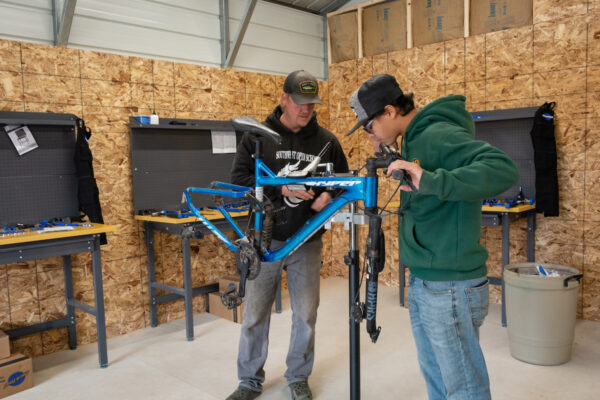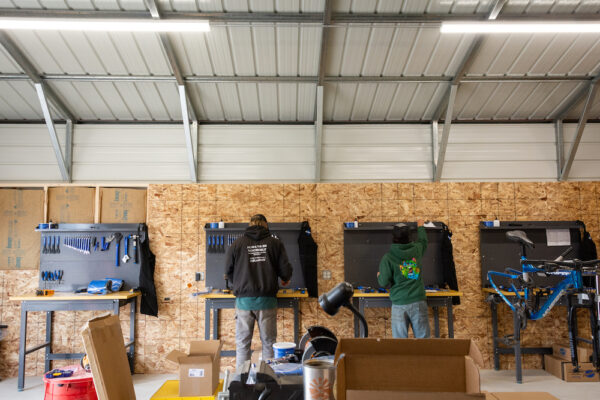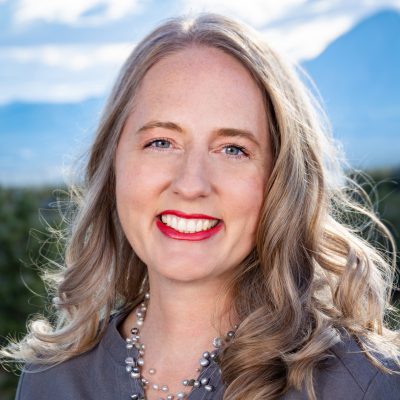Stories
Rural Communities Tackle Rising Hunger With Creative SolutionsAmid federal cuts, people in the rural Mountain West are finding ways to fill the gaps and feed their neighbors. Read more
Scott Spear, a SWOS instructor who oversees the new bike mechanic program, poses in front of the newly constructed shop. Photo by Jodi Jahrling.
It’s hard to spend time in Cortez, Colorado, without noticing bikes are everywhere. Road bikes, mountain bikes, commuter bikes. The city has developed a reputation—and an economy—around the sport. Just to the east, one of the country’s most lauded mountain bike trail systems, Phil’s World, beckons locals and outsiders, who come to ride its flowy downhill routes. Cortez is also a frequent stop on the Ride the Rockies Bicycle Tour, which brings thousands of riders and spectators to southwest Colorado each summer. And the annual 12 Hours of Mesa Verde mountain biking endurance race has become a signature event and fundraiser for youth organizations.
The robust cycling industry means bike maintenance skills translate to the workforce as well, and as that industry grows, the Cortez area needs more skilled workers. That’s why Casey Simpson’s phone rang last winter.
Simpson is the director of the Southwest Open School (SWOS), an experiential education program that immerses high school students in the outdoors and surrounding community. In January, a representative from Project Bike Tech, a nonprofit that incorporates bicycle maintenance programs into schools, asked if SWOS would be interested in building a bike shop and designing a curriculum around bike mechanics.
The proposal seemed a clear fit to Simpson, who saw far-reaching benefits in this type of education. Much of the SWOS curriculum focuses on career and technical education, and having a bike shop on campus would prepare students—many of whom are already cyclists—for a growing industry in their hometown. While students would have access to tools, bikes, and a new career path, the community also stood to gain from trained workers who could fill openings at local shops, like Kokopelli Bike and Board, which is regularly seeking additional bike techs.

SWOS student Anthony “A.J.” Saiz Jr. works on a bike with Scott Spear in the newly built shop. Photo by Jodi Jahrling.
Project Bike Tech had already secured funding to certify a SWOS staffer, Scott Spear, in bike mechanics and purchase all the necessary equipment—including high-end tools, benches, bike stands, and 10 workstations for students to use. But there was one catch: SWOS needed to build out a space for all the equipment—and fast. So in the spring SWOS had a prefabricated metal shop built.
By summer, Simpson and Spear realized they’d made a critical construction error: The floor was gravel—which not only didn’t work great for bike stands and workstations—but the porous floor also meant when the monsoons hit over the summer, the entire shop flooded. With only a couple of months before the new curriculum was set to debut in October, SWOS needed a solution and fast.
Simpson reached out to Nicci Crowley, the LOR Foundation’s Cortez community officer who had also previously taught at SWOS, with an idea for a simple solution: A concrete floor would help ensure the success of the new bike program. “The community needs more employees and more trained, certified employees,” Crowley says. “I think it was an easy step to help an organization that is providing workforce development skills for students.”
Within two weeks, LOR approved a $10,700 grant for SWOS to not only pour a concrete floor, but also to insulate the building so students could work in the shop when the weather turned cold. “I’ve never seen an organization respond as quickly to an urgent need as LOR did,” Simpson says. “It was pretty amazing. Normally with grants, it’s six months or longer before you get any feedback.”

Workstations along the wall of the interior of the bike shop. Photo by Jodi Jahrling.
With a completed shop (concrete was poured in September) and an eager cohort of students, Spear has started teaching basic mechanic skills to students after school with hundreds of the broken or underutilized bikes in the Cortez community. Spear has been collecting and stockpiling those rides with help from organizations like the Bridge Shelter, and the goal is to work with students to fix as many as possible, putting them back onto the street for free. Plus, he says, the stockpile lets SWOS use parts from one bike to fix another, keeping costs low.
This winter, the program will expand as Spear leads a month-long intensive course in which students will emerge with a bicycle maintenance certificate. As part of the course, students will learn about the history of biking, its impact on community and climate, and how it became an economic driver. Wrench in hand, students will also become proficient with the literal nuts and bolts of bike mechanics—so by spring, when local shops look to fill out their seasonal workforce, they’ll be prime for hiring.
SWOS is currently accepting donations to buy new bikes for students to ride as part of their training and the outdoor curriculum.
Donate hereReach out to connect on important matters for your community or your organization.

Nicci prides herself on being a connector of people and ideas—a trait that’s central to her work as the LOR Foundation’s community officer in Cortez, Colorado. She listens to community members to understand the challenges they collectively face and then… Meet Nicci
Stories
Rural Communities Tackle Rising Hunger With Creative SolutionsAmid federal cuts, people in the rural Mountain West are finding ways to fill the gaps and feed their neighbors. Read more
Stories
Mapping Taos’ Cultural Assets to Protect the Past and Guide the FutureAmid booming growth, a Taos County initiative charts a path toward sustainable development and community preservation. Read more
Stories
Artisanal Popsicles Help Fundraise for Cortez NonprofitsBuilding on their early success, one Cortez group is creating unique treats that support both the community and local growers. Read more
Stories
An Anthology and Writers Group Elevate Cortez AuthorsThe Four Corners region is home to many talented writers. A new book and nonprofit are giving them a platform. Read more
If you have an idea for improving quality of life in Cortez or Monte Vista, Colorado; Lander, Wyoming; Libby, Montana; Questa or Taos, New Mexico; or Weiser, Idaho, use this form to start a conversation with us.
"*" indicates required fields
